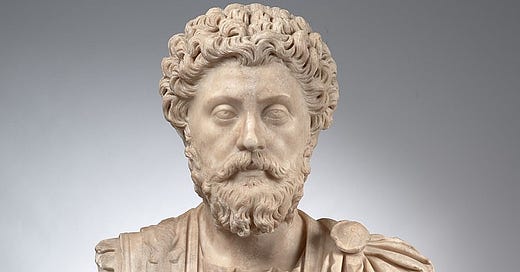In book seven of the Meditations, Marcus Aurelius reminds himself of several Stoic principles he wishes to keep in mind. Throughout the Meditations, you can find Marcus performing this same task, summarizing core principles he wishes to keep forefront to help ground himself in the day. In entry 29, he writes:
“Discard your misperceptions.
Stop being jerked like a puppet.
Limit yourself to the present.
Understand what happens - to you, to others.
Analyze what exists, break it all down: material and cause.
Anticipate your final hours.
Other people's mistakes? Leave them to their makers.”
Perception and Entanglement
A core aspect of Stoicism is being able to properly perceive the world around oneself. So often, we get caught up in the moment and do not allow ourselves to objectively understand what is going on. Rather, we rush into the situation with our emotions, responding from an emotional place rather than through logic and reason. We never provide ourselves the opportunity to properly perceive the event and instead become entangled within it.
Epictetus taught his students to avoid relying on their emotions and instead take a step back and survey the landscape from an objective point of view. He reminded his students that life always has two handles and it is up to us to decide which handle we want to grab at any given time.
“Every situation has two handles, as it were, one making it supportable and the other insupportable.”
Time
Seneca once remarked in his short essay On The Shortness of Life that:
“No one will bring back the years; no one will restore you to yourself. Life will follow the path it began to take, and will neither reverse nor check its course.”
Time is a constantly fleeting thing--once it is gone, it is gone and can never be returned. Yet we often find ourselves dwelling on the past or anticipating the future and being stuck in it, all the while missing the present moment.
The past is there for guidance, the future for roadmapping, but it is within the present that everything must occur. Reminding himself of this brief and transient notion of time, Marcus Aurelius writes to himself in book three of the Meditations:
“Forget everything else. Keep hold of this alone and remember it: Each of us lives only now, this brief instant. The rest has been lived already, or is impossible to see. The span we live is small - small as the corner of the earth in which we live it.”
Reason and Analysis
Epictetus once taught his students:
“If we look with due care, we'll find that there is nothing by which the rational creature is so distressed as by that which is contrary to reason, and that, conversely, there is nothing to which he is so attracted as that which is reasonable.”
Reason was key to the Stoics. Once we are able to remove emotion from our judgments and can properly understand the situation at hand, we are better equipped to break it down and see its moving parts.
Throughout the Meditations, Marcus writes to himself in first principles, attempting to properly breakdown events and items to better provide objective truth to them and remove his emotion. The below exercise is a great example of his attempt to do this:
“Like seeing roasted meat and other dishes in front of you and suddenly realizing: This is a dead fish. A dead bird. A dead pig. Or that this noble vintage is grape juice, and the purple robes are sheep wool dyed with shellfish blood… Perceptions like that - latching onto things and piercing through them, so we see what they really are. That's what we need to do all the time - all through our lives when things lay claim to our trust - to lay them bare and see how pointless they are, to strip away the legend that encrusts them.”
Anticipate Death
Perhaps the most common topic held within the Meditations, and a constant reminder to Marcus was the topic of death. The Meditations was written in the final years of Marcus’ life and it is believed that he suffered for a long while with illness before he died. It is easy, therefore, to see and understand why so much of the Meditations is devoted to death and its fast approaching nature.
“You could leave life right now. Let that determine what you do and say and think.”
Seneca likewise laments that not enough people understand the shortness of life and think we will live forever.
“No one keeps death in view, no one refrains from hopes that look far ahead…”
Other People’s Actions
The final reminder Marcus leaves for himself is that of other people. Marcus often wrote of the need to control oneself and leave the actions of others where they ought to be--with those people. Marcus understood the famous Epictetus dictum that we can only control the things within our power. Elsewhere in the Meditations he writes:
“Don't waste the rest of your time here worrying about other people-unless it affects the common good.”
Marcus continually came back to these two sentiments of control and the people within society we live with. He often thought about and wrote about how actions affect others and not just the self. His philosophy on this is summarized in this final quote, one that he came back to time and time again:
“What injures the hive injures the bee.”





